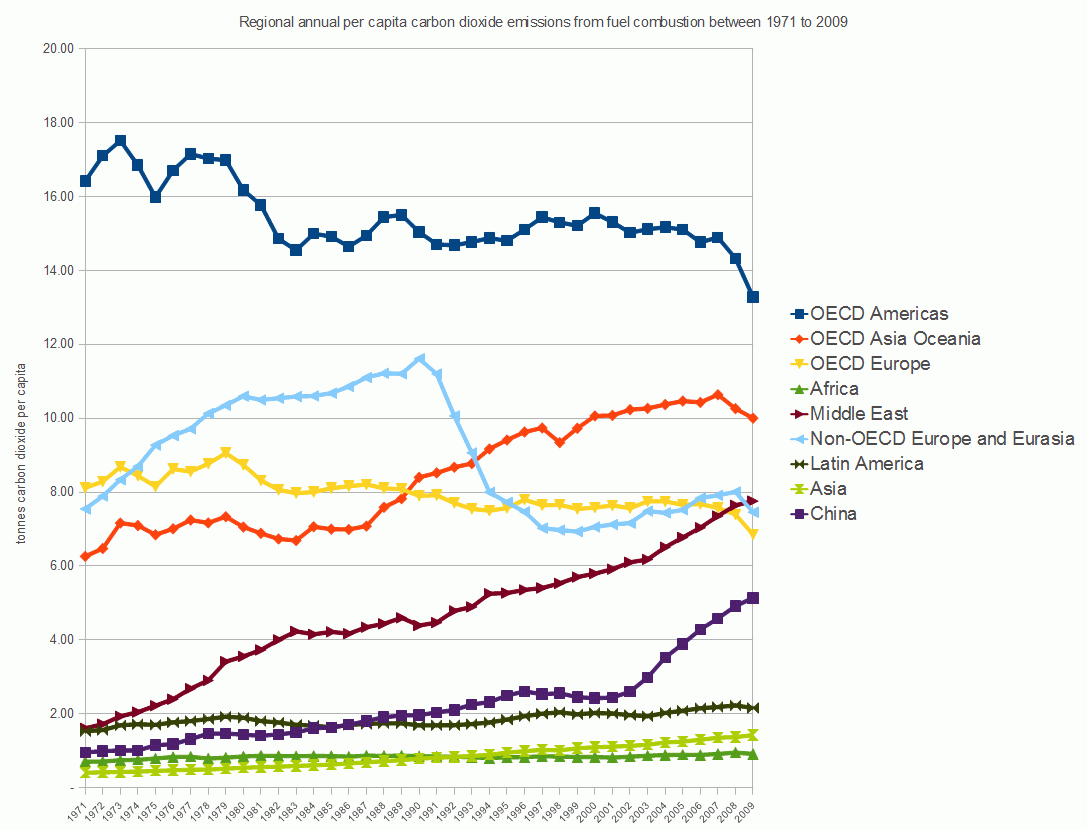Cajun,
Thanks for looking into the numbers. However, the wording in you final point fringes on being untrue and is not supported by the previous quotes. Although events in 2008 had nothing to do with wind power tripling in 2007, you cannot conclude that events in 2008 had nothing to do with reductions in emissions per capita in 2008 and beyond. The recession most certainly did play a part in the reduction, as noted in your first quote. That being said, my comment did under represent the impact of emission reduction measures currently taking place and I appreciate you bringing in the numbers to demonstrate that.
Demonstrating that emission reduction measures have been effective at reducing emission is not an argument against my stance. It is likely that the increase in awareness of climate change is pushing some of the public and, subsequently, some of the government to act in a more environmental conscious manner. As I said before, if emissions can continue to drop in the US without the use of more stringent measures, then I’d be all for it. The best way to promote the reduction of emissions without the need for taxes or other such measures is to
properly educate the public on climate change science (cough, cough). However, emissions need to continue to drop at a faster rate and this is not likely to happen on its own, especially within the commercial/industrial sector.
rb1957,
I don’t believe you read the Real Climate article. If you did, you’d clearly see the discussion on what actually happened with arctic ice in 1922. It was indeed lower than normal (for the time) but the reduction was spatially isolated. Furthermore, it has dropped to a much lower extent and at a much faster rate recently.
[image
]
[ul]
[li]The point that the original article was trying to make in 1922 was that ice in that region was lower than normal. This was true.[/li]
[li]The point that SNOPES was trying to make was that the ACTUAL article (not including the fabricated line) was true and that “it isn’t substantive evidence either for or against the concept of anthropogenic global warming[/b]. This is true[/li]
[li]The point “skeptics” were trying to make by fabricating the article to include the extra line at the end was that claims made by scientists where wrong back then and are therefore wrong today. This is untrue. The quote was a fabrication. The extension to anything relevant to today is a non-sequitar (even if the quote wasn’t a fabrication).[/li]
[li]The point you are trying to make is that ice levels decrease and increase and therefore there’s nothing unusual about the recent decline. This is untrue. Levels have been flat for ~80 years up to 1970 when they started to drop at a rapid rate (I’ll also note that long-term solar cycles peaked around 1950 and have been in decline ever since).[/li]
[li]The point I’m trying to make is that “skeptics” fabricated the quote to make a stupid argument. This is true. It’s not just trash, it’s not just dishonest trash, it’s dishonest trash that is so stupid that would STILL be trash even if it were honest. So when GWPF uses such trash as a premise for an article or when CFACT tweets about it, you need to seriously question the validity of their work. This is also true.[/li][/ul]
![[ponder] [ponder] [ponder]](/data/assets/smilies/ponder.gif)
![[ponder] [ponder] [ponder]](/data/assets/smilies/ponder.gif)

